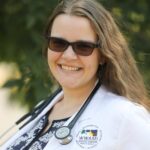“Discovering the Courage to Pursue My Dreams” by Sarah Busch (Botswana)
RPCVs in the News: UWMedicine as told to Nicole Beattie
Sarah Busch (Botswana 2018-20), a third-year medical student at the University of Washington School of Medicine, shares how scholarships are helping her become a doctor and fulfill her passion for public health.
•
I was born in Great Falls, Montana, the oldest daughter in a family with nine children. I raised a lot of my younger siblings, and maybe that’s where taking care of people started. But it was a fundamentalist environment that didn’t believe women should have careers or pursue big things. And I got to the point where I realized that the life my parents were living — and that they were giving me — was not the life I wanted.
I liked science, and when I was in high school, I took Advanced Placement Biology. The teacher was a huge science nerd and really unashamed about it. At that point in my life, I needed to see someone who was unapologetic about the things they loved. I grew brave enough to choose my own path, which led me to earn two bachelor’s degrees, one in human biology and another in microbiology, with a minor in public health.
I grew passionate about public health because of its community-mindedness, the fact that you’re preventing illness and disease, you’re bridging gaps to help patients identify where community resources are. I wanted to put that into practice.
Finding my passion for public health
After graduation, my husband and I joined the Peace Corps, and we served for two years in Botswana, working in the field of public health.
During my time there, I helped clean up garbage sites that were breeding grounds for mosquitoes, preventing the spread of malaria. I supported public health efforts related to HIV and AIDS by participating in wellness fairs, providing education about mother-to-child transmission and offering nutritional counseling. We built gardens for clinics so they could provide highly nutritious foods to patients with HIV because while one is on antiretrovirals, you can feel pretty sick, which leads to medicine non-adherence. Access to a nutritious diet can help patients feel well enough to take antiretrovirals that suppress viral loads and help decrease the risk of transmission.
But my favorite project was providing STEM education to adolescent girls. I was introduced to a class that was failing, and if they couldn’t pass Form 3 (eighth grade), they wouldn’t be able to continue their education. From my own experience, I knew that the paths to success are narrow, often prohibitively so. I tutored them, and by the end of the year, not only did the girls pass, but many did well in science and math.
It was around that time that I started telling myself, “I can do big and hard things. And if someone somewhere has done this, then it’s possible that I can do it, too.” The experience helped me realize I could become a doctor. It led to me studying for the MCAT and being accepted into the UW School of Medicine.
I want to pursue interventional radiology, which is a hard, extremely competitive and male-dominated field. It uses images to guide procedures, so practitioners can retrieve clots in the brain of a patient who has had a stroke or peek at joints to target injections and relieve pain.
I plan to practice in Montana and love the idea of what interventional radiology can do for rural communities in terms of public health — helping patients being able to go and have a central line placed at their local hospital rather than having to drive for hours.
“I can do big and hard things. And if someone somewhere has done this, then it’s possible that I can do it, too.”
My goal is to pay it forward to future generations of hopeful students, especially those who are institutionally underrepresented in medicine. Whether they’re LGBTQ, people of color, from lower socioeconomic backgrounds, etc., going to medical school is harder than it should be. Representation matters, and systemic barriers inhibit diversity in representation. People with backgrounds like mine, or diverse backgrounds in general, can bridge gaps and help find ways to communicate that improve patient care.
Scholarships helped to fund my education. Now, I have a responsibility to give back, create opportunities for other students and make their path a little smoother.

An inspiring story for younger people to consider!
What an incredibly committed person. You brought so much to the Peace Corps and to the people of Botswana. Now soon you will be doing this for Montana.